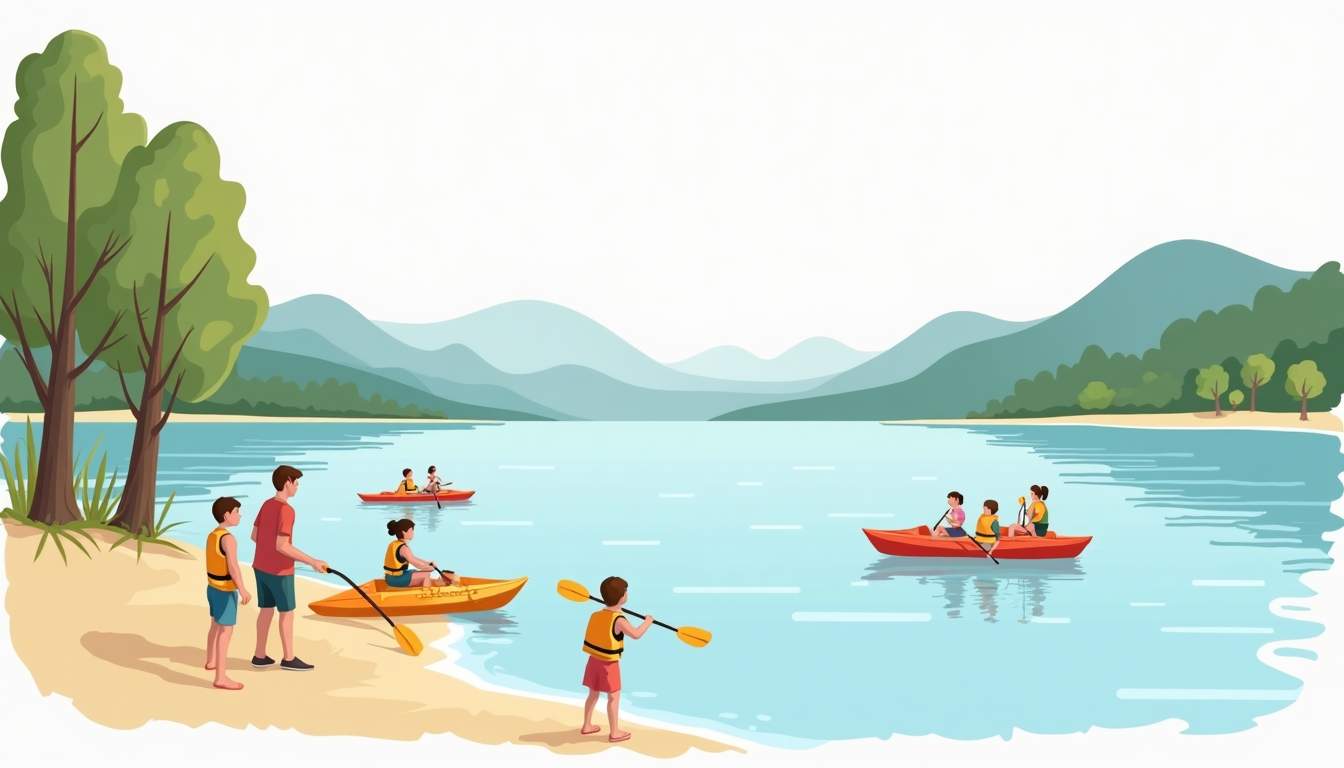
Water has a way of rewriting ordinary days into long-lasting memories. Whether it is a backyard sprinkler on a hot afternoon, the hush of dawn at a lakeshore, or the thunderous applause of waves on a rocky beach, water invites play, quiet, and connection. Families who prioritize time around water often find that the simplest activities become the most treasured. This article offers ideas, safety considerations, and ways to turn ordinary water experiences into meaningful family traditions that last through seasons and years.
Time spent near water tends to slow the rhythm of a household. The sensory elements — the smell of salt or fresh water, the sound of lapping waves, the cool touch against sun-warmed skin — all work together to ground attention in the present. Children benefit from sensory-rich environments for development, and adults often find such settings restorative. Beyond sensory pleasure, shared water activities create natural opportunities for teamwork, storytelling, and gentle risk-taking that build confidence.
Water also has social power. Group activities like building a sandcastle, paddling a canoe, or washing the family dog involve negotiation, planning, and celebration. Those small collaborative tasks teach cooperation without feeling like formal lessons. Over time, repeating simple rituals — a morning swim before school or a weekend trip to a favorite pond — creates continuity. Those continuities help children form secure attachments and provide adults with anchors in busy lives.
Moreover, water environments often encourage physical activity in creative and spontaneous ways. Children learn to gauge depth, balance on slippery stones, and experiment with buoyancy, all of which enhance motor skills and body awareness. Adults, too, benefit from these playful challenges, experiencing a sense of vitality and connection with nature. The dynamic and ever-changing nature of water invites curiosity and adaptability, qualities that nourish emotional resilience in both young and old.
Furthermore, water holds a unique cultural and metaphorical significance that enriches these moments. Throughout history, water has symbolized cleansing, renewal, and transformation, making interactions with it deeply meaningful. Families often embed their own stories and traditions into water rituals, whether it’s skipping stones, throwing coins for wishes, or recounting ancestral tales tied to lakes or rivers. These layers of meaning enrich the experience, fostering a deeper appreciation for both personal heritage and the natural world.
Backyards can become water playgrounds with minimal expense and maximum joy. A sprinkler or simple slip-and-slide turns a hot afternoon into a giggling, cooling event. Paddling pools offer toddlers a chance to splash under supervision without the risks of deeper water. To keep things safe, designate a supervising adult whenever children are in or near water and establish clear rules about running and diving. Sun protection is essential: wide-brim hats, frequent sunscreen reapplication, and shaded breaks make the fun sustainable.

Short walks to local creeks, ponds, or small lakes are perfect for quick escapes. Bring a net, a clear container, and a small field guide to the creatures that live in the shallows. These low-cost excursions teach observation skills and cultivate curiosity about ecosystems. Encourage gentle behavior—avoid stepping on plants and return any animals to their homes. Such outings foster respect for nature and can spark a lifelong interest in conservation.
Coastal and lakeside trips offer diverse experiences: tide pools full of miniature worlds, broad expanses of sand perfect for kite flying, and deep blue water inviting boats and swims. Start with planning that matches the family's comfort level. For families new to the coast, short visits during lower tides are less intimidating and reveal fascinating marine life. For calmer lake settings, inflatable kayaks or family float tubes can be a gentle introduction to being on the water.
Pack for the whole day: a beach umbrella, layered clothing for shifting temperatures, enough water, and snacks that travel well. Respectful behavior toward wildlife and other beachgoers keeps the environment pleasant for everyone. When weather is unpredictable, having a backup plan — exploring a nearby nature center or museum — helps maintain the spirit of the outing without forcing risky conditions.
Swimming is a life skill that also opens the door to countless memories. Formal lessons accelerate skill building, but family time in the pool builds comfort and confidence. Start with short, structured play sessions: games that encourage submersion, breath control, and kicking. Celebrate small milestones, like blowing bubbles or floating on the back. When children see adults enjoying the water calmly, fear often diminishes.
For families with mixed skill levels, designate quiet times for beginners and more adventurous windows for practiced swimmers. Pool games that involve gentle cooperation—passing a ball while floating or forming a linked circle—encourage social connection and help new swimmers feel supported. Regular practice, sprinkled with play, keeps progress steady without pressure.
Even a short motorboat ride or a family row in a canoe expands horizons. Effective planning makes boat days relaxing rather than stressful. Check weather forecasts, confirm life jacket sizes for everyone, and pack a dry bag for essentials like phones, keys, and spare clothes. Before leaving the dock, cover basic safety practices: how to sit, where to hold on, and what to do in case of a capsize. Giving each family member a light duty — spotter, snack manager, or tide watcher — helps them feel engaged and responsible.

Turn navigation into a learning game. Older children can learn simple compass points or read a short map, while younger ones can tally seabirds or listen for the sound of the motor. Capture the day with a few photos or a small sketchbook, but avoid constant screen time; many of the best memories come from fully present moments when devices are off.
Evening water activities have a distinct magic. Watching fireflies near a pond, listening to the hush of waves under a moonlit sky, or stargazing from a dock transforms the ordinary into the contemplative. Create gentle rituals like a short gratitude round where each person names a favorite moment from the day. Soft blankets, a thermos of warm drink, and low conversation set the tone. Nighttime activities teach children to appreciate quiet and can strengthen family bonds in a calm, reflective way.
Be mindful of safety at night: bring headlamps, keep to familiar areas, and avoid unlit water edges. Including a flashlight scavenger hunt or a glow-stick float in a pool can add playful elements without compromising safety. Nighttime around water need not be elaborate to be powerful—sometimes the simplest moments, witnessed together, become the most lasting.
Comfort and thoughtfulness go hand-in-hand with memorable water experiences. Choose clothing that dries quickly and offers sun protection. Bring a small first-aid kit, reef-safe sunscreen, biodegradable soap for cleaning hands, and reusable water bottles to stay hydrated. Pack snacks that are high in energy but won’t create excess trash—nuts, fruit, and whole-grain crackers are good choices. When possible, leave the site cleaner than it was found; picking up a stray piece of litter teaches stewardship with a simple action.
Consider investing in a few multipurpose items that make outings easier: a compact picnic blanket, a sturdy cooler, and a collapsible bucket for beach finds or quick foot rinses. For longer trips, a dry bag for electronics and a lightweight canopy for shade add comfort. Thoughtful logistics mean less time fussing and more time enjoying the water together.
Traditions anchor celebrations and create continuity across years. Establishing a few recurring water rituals—an annual summer sunrise swim, a birthday beach picnic, or a rain-day puddle walk—gives families something to anticipate. These rituals don't need to be elaborate; consistency is often more meaningful than scale. Over time, children remember the pattern and feel a sense of belonging that outlasts the specific events.

Storytelling is another powerful tool. Capture short stories from each outing—funny moments, unexpected discoveries, or a small lesson learned—and save them in a notebook or digital folder. On future trips, reading past entries sparks laughter and reflection. Photos help, but stories add context and emotion. When children hear the narratives of their water adventures, they inherit a sense of family history and identity tied to those places.
Water memories should be accessible to everyone in the family. Adaptations make activities inclusive: stable transfer platforms or pool lifts for adults with mobility needs, quieter motors or paddles for sensory-sensitive children, and shore-based roles like tide pooling or wildlife spotting for those who prefer not to enter the water. Communication before the trip about comfort levels helps tailor plans. Offer choices during the outing so everyone can participate at a level that feels safe and enjoyable.
Local organizations often provide accessible beaches, adaptive equipment rentals, and staff trained to support diverse needs. Seeking out these resources expands possibilities and demonstrates a family commitment to inclusion. The goal is shared presence — being together in a water setting in ways that honor each person's abilities and preferences.
Water weaves together play, learning, and connection. By planning with safety and intention, families can transform casual outings into meaningful traditions. The best water memories are rarely the most extravagant; they are the everyday practices that repeat, evolve, and become part of a family’s story. Over time, the sound of waves, the feel of cool water, and the ritual of packing a picnic become signposts of a life well-shared. Those small, repeated moments are the true treasures that last.
Embrace the beauty of water and create lasting family traditions in a community designed for joyful living. At Tennessee National, you’ll find more than just luxury homes—you’ll find a lifestyle centered around waterfront experiences, nature trails, and vibrant social opportunities. From the private marina to scenic lakeside views, every day offers moments to connect and unwind. Ready to start making your own water memories? Schedule a Private Tour today and see how Tennessee National can be the perfect backdrop for your family’s story.